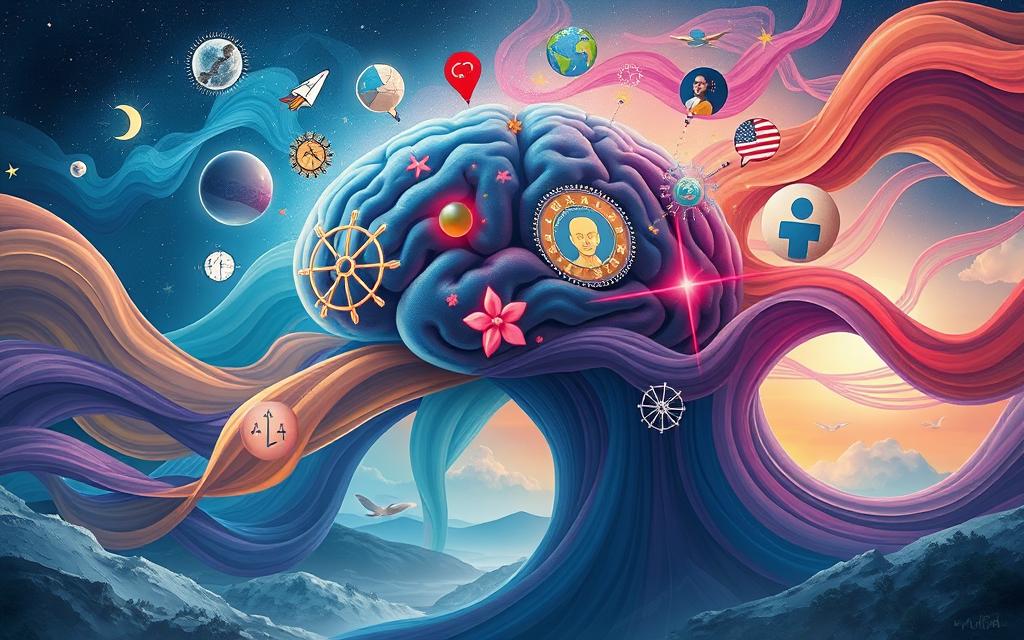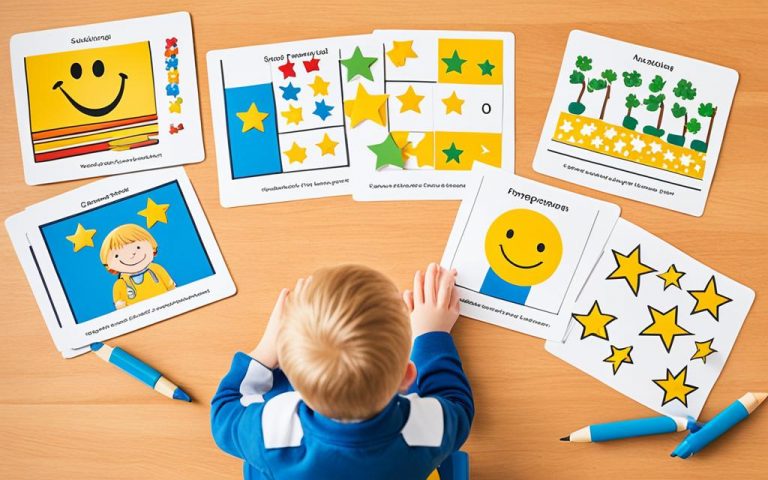Discover the Basics of Psychology: Mind Unveiled
Psychology is the study of how we think and behave. It’s a deep dive into our minds. It comes from the Greek words “psyche” (life) and “logos” (explanation). This makes it a fascinating way to understand ourselves better1.
When you start learning about psychology, you’ll see how it helps us in many areas. It’s used in treating mental health issues and helping us deal with everyday problems. The goal is to make our lives better by understanding our minds2.
Exploring psychology shows us the biological side of behavior. Some genes might make people more likely to have mental health issues. Knowing this helps create treatments that work better for each person2.
Then, you’ll discover important chemicals in our brains. Dopamine, serotonin, and norepinephrine affect our feelings, drive, and mental health23.
As you keep learning, you’ll come across different theories and models. For example, the multi-store memory model by Atkinson and Shiffrin (1968) explains how we remember and store information13.
Key Takeaways
- Psychology studies human behavior and cognitive processes
- It originated from Greek terms “psyche” and “logos”
- Genetics play a role in mental health predispositions
- Neurotransmitters influence emotions and behavior
- Memory models explain information processing
- Psychology applies to various aspects of human life
Introduction to Psychology: The Science of Mind and Behavior
Psychology is a fascinating study of the human mind and behavior. It explores how we think, feel, and act. Many students choose psychology to understand what makes us tick4.
It started in the 19th century. Wilhelm Wundt opened the first psychology lab in 1879. He focused on the mind’s conscious experiences and developed structuralism to study the mind’s nature4.
Now, psychology covers many topics. It looks at memory, social interactions, and more. Psychologists use science to understand human behavior. This helps in many fields, like brain research and education.
Students in psychology learn to think deeply and use the scientific method. They value human diversity and get better at talking to others. These skills are why many choose psychology, making up about 6% of U.S. bachelor’s degrees4.
| Skill | Description | Application |
|---|---|---|
| Critical Thinking | Analyzing complex issues | Research, problem-solving |
| Scientific Method | Systematic approach to inquiry | Experimental design, data analysis |
| Communication | Effective expression of ideas | Counseling, report writing |
Exploring psychology shows its big impact on our lives. It helps us understand ourselves and others. The field is always growing, giving us new insights into the human mind and behavior.
Historical Development of Psychology
The story of psychology is truly fascinating. It goes back to ancient times and has changed a lot over the years. Let’s look at the key events and people who helped shape this field.
Early Philosophical Foundations
Ancient Greek philosophers were among the first to think deeply about human behavior and the mind. Their ideas set the stage for later scientific studies.
Emergence of Psychology as a Scientific Discipline
In 1879, psychology became a science. Wilhelm Wundt opened the first psychology lab at the University of Leipzig. This event marked the beginning of psychology as a unique field. Wundt’s work drew in about 17,000 students, with many pursuing psychology degrees5.
Soon, different views on psychology started to appear. Edward B. Titchener focused on the mind’s basic parts. William James, known as the father of American psychology, emphasized practical uses of the mind. His book “The Principles of Psychology” became a key text in the field5.
Key Figures in Psychology’s History
Many important people have shaped psychology. Sigmund Freud introduced psychoanalysis, looking at the unconscious mind. John B. Watson and B.F. Skinner later focused on what we can see and do5.
Psychology kept growing. Jean Piaget studied how children think. Humanistic psychology, led by Carl Rogers and Abraham Maslow, became a new approach5. Albert Bandura, a Canadian psychologist, developed the social learning theory in the 1960s6.
| School of Thought | Key Figure | Main Focus |
|---|---|---|
| Structuralism | Edward B. Titchener | Basic elements of the mind |
| Functionalism | William James | Practical function of mental processes |
| Psychoanalysis | Sigmund Freud | Unconscious mind |
| Behaviorism | John B. Watson, B.F. Skinner | Observable behaviors |
| Cognitive Psychology | Jean Piaget | Cognitive processes |
The cognitive revolution changed how we study psychology. It focuses on mental processes and still shapes research and practice today.
The Biological Basis of Behavior
Your brain is the core of everything you think, feel, and do7. It’s where your genetics, brain structure, and neurotransmitters come together to make you who you are. This field looks at how biology and behavior are connected, helping us understand why we act the way we do.
Neurons are the main parts of your nervous system and are key to how you communicate and behave7. They connect to form networks that let your brain process information and react to the world. Knowing about these cells helps us understand how your brain works.
Neurotransmitters send messages that affect your mood, thoughts, and actions. Dopamine, serotonin, and norepinephrine are some of these important chemicals. They work together, impacting everything from your happiness to your focus.
Genetics also shapes your behavior. The debate over nature versus nurture suggests that your genes and environment work together to create your unique behaviors7. New findings in epigenetics show how early experiences can change your genes and affect your health7.
Researchers use different methods to study behavior’s biological roots. Techniques like CAT scans, MRI, and fMRI let scientists see the brain’s structure and function8. It’s important to consider ethics in research, especially when using animals8.
Knowing about the biological roots of behavior helps us in many ways. It guides treatments for mental health issues, often using drugs that target specific chemicals. Understanding this can help you better know yourself and improve your life7.
Cognitive Processes: How We Think and Learn
Cognitive psychology looks into how we think, learn, and process information. This field became important in the 1950s, changing how we study psychology91011. Let’s explore the interesting world of how our minds work.
Attention and Perception
Your brain picks out what to focus on from all the information it gets. This is called attention. It helps shape how we see the world. Researchers in cognitive psychology study this to understand how we make sense of things.
Memory and Information Processing
Memory lets you store and bring back information. Cognitive psychology has found some interesting things about memory. For instance, you can remember about 80% of random three-letter strings after just 3 seconds, but only 10% after 18 seconds10. This shows how quickly short-term memory forgets things without help.
Problem-Solving and Decision-Making
Cognitive psychology also looks at how we solve problems and make choices. Studies have found ways to improve learning, like practicing recalling information and getting feedback on what you don’t know10. These tips can help in school and everyday life.
| Cognitive Process | Description | Application |
|---|---|---|
| Attention | Focusing on specific stimuli | Improving concentration |
| Perception | Interpreting sensory information | Understanding biases |
| Memory | Storing and retrieving information | Enhancing learning techniques |
| Problem-Solving | Finding solutions to challenges | Developing critical thinking |
Cognitive psychology has greatly helped us understand our mental processes. It has led to new treatments for mental health issues and is key to keeping our minds healthy9. As we keep researching, we learn more about how our minds work. This helps us improve how we learn, remember, and process information.
Emotional Intelligence and Affect
Emotional intelligence is key in your everyday life. It shapes how you interact with others and make choices. It’s about knowing and handling your and others’ feelings. In fact, it’s seen as more vital than IQ for achieving success12.
It has four main levels: perceiving, reasoning with, understanding, and managing emotions12. These skills help you handle tough social situations and build better relationships. Those with high emotional intelligence can take criticism well, bounce back from mistakes, and connect deeply with others12.
Knowing how to understand emotions is central to emotional smarts. Charles Darwin first pointed out that facial expressions show emotions universally13. Then, Paul Ekman found six basic emotions: joy, sadness, fear, anger, surprise, and disgust13. Robert Plutchik later added eight basic emotions, with pairs of opposites13.
Being able to control your emotions is crucial. It means handling your feelings in tough times and getting others’ feelings too12. This skill can boost your mental health, work performance, and leadership skills14.
You can get better at emotional intelligence by practicing. Notice how people communicate, feel for others, and see how feelings affect your choices12. Therapy can also help, leading to better mental health and happiness14.
Basics of Psychology: Core Concepts and Principles
Psychology studies human behavior and mental processes. It looks at how people think, feel, and act. This field helps us understand life’s many aspects, from personal growth to how we interact with others.
Psychologists work in many places like hospitals, schools, and government agencies. They use psychological principles to solve real-world problems. Their work goes beyond therapy, covering teaching, research, and designing products15.
Psychology has many viewpoints. These include biological, cognitive, behavioral, evolutionary, and humanistic perspectives. Each view gives us new insights into human behavior and mental processes15.
Psychology has many branches. These include clinical, cognitive, developmental, and social psychology. Each branch focuses on specific parts of human behavior15.
Psychological research uses different types of variables. Quantitative variables measure things like depression or the number of siblings. Categorical variables cover choices like the major you choose or your nationality16.
Learning about psychological principles can change your life. It helps you stop bad habits, set routines, handle stress, and talk better with others. These examples show how psychology helps us in everyday life15.
Statistical methods are key in psychology research. Researchers use random sampling to study large groups. They look at group differences and how variables relate to each other. This helps us understand human behavior16.
Psychology affects many areas. Marketers use it in ads. Employers use it to manage the workplace. Even product designers think about psychology when creating things15.
By learning about these core ideas, you get insights into human behavior and mental processes. This knowledge can improve your life, work, and how you connect with others.
Developmental Psychology: Lifespan Perspectives
Developmental psychology looks at how people change from birth to old age. It focuses on the different stages of life and how we grow. Paul Baltes, a German psychologist, said development lasts a lifetime. It’s complex, changing in many ways, and shaped by our environment17.
Childhood and Adolescence
In childhood and adolescence, kids go through big changes in their bodies, minds, and feelings. The Positive Youth Development (PYD) approach sees the good in young people and their potential to help society17. Programs like Big Brothers/Big Sisters help kids do better in school and stay away from bad habits17.
Adulthood and Aging
As we grow into adulthood and get older, we keep changing. This includes changes in our bodies, minds, and how we connect with others. The idea of plasticity in development means we can still grow and adapt as we age17.
Theories of Human Development
There are many theories about how we grow throughout our lives. These ideas help us understand the complex ways we change. For example, Baltes said development is about both growing and losing things as we age17.

| Developmental Stage | Key Characteristics | Developmental Tasks |
|---|---|---|
| Infancy | Rapid physical growth | Forming attachments |
| Childhood | Cognitive development | Learning social skills |
| Adolescence | Identity formation | Developing autonomy |
| Adulthood | Career and relationship focus | Establishing intimacy |
| Late Adulthood | Life reflection | Maintaining integrity |
Learning about lifespan development helps us understand our own growth and the factors that shape us. It shows us the complex nature of development. This knowledge helps us support ourselves and others at every stage of life1718.
Social Psychology: Understanding Human Interactions
Social psychology looks into how we think, feel, and act with others. It helps us understand group behavior, how we influence each other, and our personal relationships.
In social psychology, you’ll learn about human behavior in groups. Concepts like conforming, following orders, and what we think about others are key. These ideas help us talk better and handle tough social situations.
Textbooks on social psychology use real-life examples to show how their findings work in the real world. They help you make sense of research and fight stereotypes19.
“Social psychology is not just about understanding others, but also about understanding ourselves in relation to others.”
Looking into how we connect with others is a big part of social psychology. It shows us how we make friends, keep them, and deal with partners. This knowledge helps us improve our own relationships and build stronger ones.
| Aspect | Impact on Behavior | Application |
|---|---|---|
| Group Dynamics | Influences decision-making | Team building |
| Social Influence | Shapes attitudes and beliefs | Marketing strategies |
| Interpersonal Relationships | Affects emotional well-being | Conflict resolution |
Today’s social psychology books also cover cultural effects, diversity, and tech’s role in our lives. These topics show how social interactions are changing with our connected world19. By looking into these areas, you get a deeper understanding of how people act in different situations.
If you’re a student or just interested in people, social psychology is worth exploring. Books on the subject start at just $25, making it easy and affordable20. Using what you learn from social psychology can make your personal and work relationships better. It helps you navigate the complex world of human interactions.
Personality Theories and Individual Differences
Personality theories try to explain why people act, think, and feel differently. They give us deep insights into how personalities form and change. This helps us grasp human behavior better.
Trait Theories
Trait theories look at stable traits that define us. The “Big Five” theory says personality has five main traits: Agreeableness, Conscientiousness, Extroversion, Neuroticism, and Openness. Studies in 2018 found these traits lead to four personality types: average, reserved, self-centered, and role model21.
Psychodynamic Approaches
Psychodynamic theories, by Freud and Erikson, focus on the hidden mind and early life in shaping who we are. They believe our early experiences deeply influence our personalities22.
Humanistic Perspectives
Humanistic theories, by Rogers and Maslow, focus on our free will and reaching our full potential. They say personal growth and our unique abilities shape our traits22.
Learning about these personality theories can shed light on your own and others’ behaviors. The National Institute of Mental Health notes that about 9.1% of U.S. adults face personality disorder symptoms yearly. This shows how vital it is to study individual differences21.
Psychological Disorders and Mental Health
Mental health is a key part of our overall health. In the U.S., 1 in 5 adults faces a mental disorder each year23. It’s important to understand these disorders to help people and find effective treatments.
The DSM-5 lists hundreds of mental disorders, from simple to complex ones24. Anxiety disorders hit nearly 30% of adults at some point, making them very common23.
Other common disorders include:
- Obsessive-compulsive disorder (OCD), affecting 2-3% of Americans23
- Eating disorders, impacting up to 5% of the population23
- Schizophrenia, affecting less than 1% of people23
In Canada, mental illness affects 1 in 5 people, similar to the U.S25.. But, getting mental health care is hard. Many people with mental disorders can’t get the help they need because of long waits or high costs25.
Psychologists are key in diagnosing and treating mental disorders. They use tests and therapies like Cognitive-Behavioral Therapy (CBT) to help people25. Early help and prevention are crucial for keeping mental health strong and reducing the effects of disorders on society.
Therapeutic Approaches in Psychology
Psychology offers many ways to help with mental health issues and improve well-being. These methods, like psychotherapy and counseling, aim to help people face challenges and live better lives.
Cognitive-Behavioral Therapy
Cognitive-Behavioral Therapy (CBT) is a popular method in mental health care. It works on changing negative thoughts and behaviors that affect your feelings. CBT is great for treating depression, anxiety, and other mood issues2627.
Psychoanalysis and Psychodynamic Therapies
Psychoanalytic therapy looks into hidden conflicts and reasons behind your actions. It’s often used for issues like compulsions and phobias. This therapy requires a close relationship with your therapist to find the deep meanings behind your thoughts and actions2628.
Humanistic and Existential Approaches
Humanistic therapy helps you accept yourself and find your true self. It focuses on your ability to make choices and find meaning in life. This type of therapy is good for boosting self-esteem, dealing with chronic health issues, and feeling worthless2627.
Each therapy type has its own benefits and uses. Your therapist might mix different approaches to fit your needs2628.
| Therapy Type | Focus | Potential Benefits |
|---|---|---|
| Cognitive-Behavioral Therapy | Changing negative thoughts and behaviors | Effective for mood disorders, anxiety, phobias |
| Psychodynamic Therapy | Uncovering unconscious conflicts | Helpful for depression, anxiety, eating disorders |
| Humanistic Therapy | Promoting self-acceptance and personal growth | Improves self-esteem, coping skills |
Studies show that many people keep getting better even after therapy ends, especially with psychodynamic therapy27. Your mental health journey is unique. Finding the right therapy can really help you move forward and feel better.
Research Methods in Psychology
Psychology uses many research methods to study human behavior and mental processes. These methods are key to understanding human behavior and mental processes. They help scientists collect data and make solid conclusions.
The scientific method is at the heart of psychological research. It starts with observing, then making a hypothesis, doing experiments, analyzing data, and concluding. This method ensures results are reliable and accurate.
Experiments are a big part of psychological research. They help show how different things affect each other. In an experiment, researchers change one thing and see how it changes another29.
Descriptive research methods like case studies, observational studies, and surveys focus on describing behaviors or phenomena. Case studies give deep insights into single cases. Surveys gather data from many people30.
Correlational studies look at how different things relate to each other without changing them. They can show if things go up or down together. But remember, just because things go together doesn’t mean one causes the other3029.
| Research Method | Description | Example |
|---|---|---|
| Experiment | Manipulates variables to establish cause-effect relationships | Testing the effect of sleep on memory |
| Survey | Collects data from a large group of people | Studying attitudes towards mental health |
| Case Study | In-depth analysis of an individual or group | Examining a person with a rare psychological disorder |
| Observational Study | Observes behavior in natural settings | Watching children’s play behavior in a playground |
Data analysis is key in psychological research. It uses statistics to understand the data and make conclusions. Researchers use methods like t-tests, ANOVA, or regression analysis based on the study and data type.
Knowing these research methods is important for anyone interested in psychology. It helps you understand and judge psychological studies. It also shows the complexity of studying human behavior and mental processes.
Applied Psychology in Everyday Life
Psychology isn’t just for books and labs. It’s a key part of our daily lives. It helps us in the workplace, schools, and health care. Applied psychology gives us insights and tools to make our lives better.
Psychology in the Workplace
At work, psychology is vital. It makes work environments better, boosts employee happiness, and improves performance. Recently, mental health at work has become a big focus. More adults are getting mental health treatment, from 19% in 2019 to 22% in 202131.
Educational Psychology
Educational psychology changes how we teach and learn. It looks at how our brains grow, what motivates us, and our differences. This is crucial because many kids face tough times. In 2021, over 588,229 children were victims of abuse or neglect, showing the need for support in schools31.
Health and Well-being
Our health and well-being are deeply connected to psychology. It shows how our minds affect our bodies and helps us live better. Managing stress is key because too much stress can make us tired and depressed32.
“Applied Psychology in Everyday Life” shows how psychology touches many parts of our lives. It looks at sports, child development, law, religion, work, and finance32. This shows how psychology is a big part of our daily lives.
| Area | Application of Psychology | Impact |
|---|---|---|
| Workplace | Organizational behavior, leadership | Improved productivity, employee satisfaction |
| Education | Learning strategies, motivation | Enhanced academic performance, personal growth |
| Health | Stress management, behavior change | Better physical and mental well-being |
By using psychological knowledge, you can tackle life’s challenges better. It helps with stress at work, learning better, and staying healthy. Applied psychology gives us tools for success every day.
Ethical Considerations in Psychology
Ethics are key in psychology. They protect participants, keep information private, and ensure professionals act right. These rules keep psychological work honest and safe for everyone involved.
In the UK, all psychology studies need approval from ethics committees before starting33. The American Psychological Association (APA) has rules for ethics in psychology34. These rules cover research, teaching, and clinical work.
Getting informed consent is vital in psychology. Researchers must tell participants about the study’s goals, risks, benefits, and their right to quit33. This helps people make choices about joining research.
Psychological ethics also protect people from harm. Researchers aim to keep risks low and not put participants in more danger than everyday life33. The APA’s General Principle A stresses doing good and avoiding harm34.
In Canada, the Canadian Code of Ethics for Psychologists guides ethical choices. It focuses on respecting dignity, caring responsibly, being honest in relationships, and being responsible to society35. These principles help psychologists deal with tough ethical issues and act professionally.
Following these ethical rules makes sure research is valid and the public trusts psychologists. This dedication to ethics is crucial for psychology’s growth and respect.
Future Directions in Psychological Science
The field of psychology is changing fast, with new trends leading the way. Over the last 16 years, technology has changed how we do research, making big leaps in understanding psychology36. Now, we can do big studies with many people at a lower cost, thanks to crowdsourcing36.
Psychology is becoming more connected with other fields like economics, biology, and computer science. These partnerships have led to big discoveries36. We’ll likely see more of this, with a focus on making research useful in real life. This is called implementation science37.
Scientists are now looking into new areas. They’re finding that most of our DNA isn’t what we thought it was. Instead, “junk DNA” is key to how genes work38. This could lead to new insights into how we think and behave.
Looking forward, we’ll see more focus on making research useful in real life. New journals are coming out to talk about how psychology affects policy36. By using psychological ideas, we can make sure research helps those who need it most37. These changes are exciting and could greatly improve our mental health and well-being.
FAQ
What is psychology?
Psychology is the study of the human mind and behavior. It looks into how we think, feel, and act. It aims to understand and improve our lives.
What are the major perspectives in psychology’s history?
Psychology has many views, like structuralism, functionalism, and psychoanalysis. Behaviorism and the cognitive revolution are also key. These views help us understand the mind and behavior.
How does biology influence behavior?
Biology, like genes and brain structure, affects our thoughts and actions. It’s important for understanding how we behave.
What are the main cognitive processes studied in psychology?
Cognitive psychology looks at how we pay attention, remember things, learn, solve problems, and make decisions. These processes help us understand human behavior.
What is emotional intelligence, and why is it important?
Emotional intelligence is knowing how to handle our and others’ feelings. It’s key for making good choices and getting along with others.
What are the core concepts and principles in psychology?
Psychology focuses on understanding consciousness, perception, and how we think and feel. It also looks at motivation, personality, and social behavior. Important principles include the debate between nature and nurture.
How does psychology study human development across the lifespan?
Developmental psychology looks at how we change from birth to old age. It covers physical, mental, social, and emotional growth. This helps us understand human development.
What does social psychology study?
Social psychology studies how people act and think because of others. It looks at things like following the crowd, making friends, and how we see others.
What are the different personality theories in psychology?
Personality theories try to explain why people are different. They include trait theories, psychodynamic views, and humanistic ideas.
How does psychology approach psychological disorders and mental health?
Psychology looks at mental health issues like anxiety and depression. It aims to understand and treat these conditions to improve mental well-being.
What are the different therapeutic approaches in psychology?
Therapies like cognitive-behavioral therapy help people deal with mental health issues. They also focus on personal growth and overcoming challenges.
What research methods are used in psychology?
Psychologists use experiments, studies, and surveys to research. The scientific method guides their work.
How is psychology applied in everyday life?
Psychology helps solve real-life problems in work, schools, and health care. It guides how we behave and change for the better.
What ethical considerations are important in psychology?
Ethics is key in psychology. It ensures research is safe and respectful, and that confidentiality is kept in therapy.
What are some future directions in psychological science?
The future might bring more use of neuroscience and AI in psychology. We’ll also see more focus on personal and cultural differences, and teamwork in research.
Source Links
- https://www.studysmarter.co.uk/explanations/psychology/basic-psychology/ – Definition, Theories & Principles, Examples
- https://aicontentfy.com/en/blog/unveiling-human-mind-intricate-domains-of-psychology – Unveiling the Human Mind: The Intricate Domains of Psychology
- https://www.vaia.com/en-us/explanations/psychology/basic-psychology/ – Definition, Theories & Principles, Examples
- https://openbooks.library.baylor.edu/psychscience/chapter/science-of-psychology/ – Ch 1: The Science of Psychology
- https://www.verywellmind.com/a-brief-history-of-psychology-through-the-years-2795245 – The Origins of Psychology: History Through the Years
- https://opentextbc.ca/introductiontopsychology/chapter/1-2-the-evolution-of-psychology-history-approaches-and-questions/ – 1.2 The Evolution of Psychology: History, Approaches, and Questions
- https://socialsci.libretexts.org/Bookshelves/Psychology/Introductory_Psychology/Psychology_(Noba)/Chapter_1:_Biological_Basis_of_Behavior – Chapter 1: Biological Basis of Behavior
- https://www.apa.org/ed/precollege/topss/lessons/biobases.pdf – PDF
- https://www.verywellmind.com/cognitive-psychology-4157181 – Cognitive Psychology: The Science of How We Think
- https://www.webmd.com/mental-health/what-is-cognitive-psychology – What Is Cognitive Psychology?
- https://www.simplypsychology.org/cognitive.html – Cognitive Approach In Psychology
- https://www.verywellmind.com/what-is-emotional-intelligence-2795423 – Emotionally Intelligent People Have These 10 Traits in Common
- https://online.uwa.edu/news/emotional-psychology/ – Science of Emotion: The Basics of Emotional Psychology | UWA
- https://drcohen.ca/the-foundation-of-emotional-intelligence/ – The Foundation of Emotional Intelligence – Dr. Eliana Cohen Psychology
- https://www.verywellmind.com/psychology-basics-4157186 – 8 Basic Psychology Facts You Should Know
- https://opentextbc.ca/researchmethods/chapter/basic-concepts/ – Basic Concepts
- https://courses.lumenlearning.com/wm-lifespandevelopment/chapter/the-lifespan-perspective/ – The Lifespan Perspective | Lifespan Development
- https://open.umn.edu/opentextbooks/textbooks/540 – Lifespan Development: A Psychological Perspective – Fourth Edition – Open Textbook Library
- https://www.abebooks.com/9780205103133/Social-Psychology-Understanding-Human-Interaction-0205103138/plp – Social Psychology: Understanding Human Interaction – Baron, Robert A: 9780205103133
- https://www.ebay.com/itm/234977855470 – Social Psychology. Understanding Human Interaction. Baron, Robert A. and Donn By | eBay
- https://www.verywellmind.com/personality-psychology-4157179 – How Personality Influences Behavior, According to Psychology
- https://www.verywellmind.com/personality-psychology-study-guide-2795699 – What Personality Theories in Psychology May Tell You About Yours
- https://www.healthline.com/health/psychological-disorders – Psychological Disorders: Types, Symptoms, Treatment
- https://www.verywellmind.com/a-list-of-psychological-disorders-2794776 – Explore a List of Psychological Disorders From the DSM-5
- https://www.camh.ca/en/camh-news-and-stories/the-role-of-psychology-in-the-mental-health-system – The Role of Psychology in the Mental Health System
- https://www.saybrook.edu/unbound/5-different-types-of-therapy-in-psychology/ – 5 Different Types of Therapy in Psychology | Saybrook University
- https://www.healthline.com/health/types-of-therapy – Types of Therapy: Different Types of Approaches and How They Work
- https://www.apa.org/topics/psychotherapy/approaches – Different approaches to psychotherapy
- https://www.simplypsychology.org/research-methods.html – Research Methods In Psychology
- https://www.verywellmind.com/introduction-to-research-methods-2795793 – How Psychologists Use Different Research in Experiments
- https://bouve.northeastern.edu/news/what-is-applied-psychology-why-is-it-important/ – What Is Applied Psychology & Why Is It Important?
- https://www.cambridgescholars.com/resources/pdfs/978-1-4438-3188-8-sample.pdf – PDF
- https://www.simplypsychology.org/ethics.html – Ethical Considerations in Psychology Research
- https://www.apa.org/ethics/code – Ethical principles of psychologists and code of conduct
- https://cpa.ca/docs/File/Ethics/CPA_Code_2017_4thEd.pdf – Microsoft Word – CPA-Code 2000 Eng_JP_Jan2014.docx
- https://selfcontrol.psych.lsa.umich.edu/wp-content/uploads/2017/07/1745691617701184.pdf – PDF
- https://www.ncbi.nlm.nih.gov/pmc/articles/PMC8543736/ – Expanding the Reach of Psychological Science Through Implementation Science: Introduction to the Special Issue
- https://www.ncbi.nlm.nih.gov/pmc/articles/PMC2763392/ – The Future of Psychology: Connecting Mind to Brain






